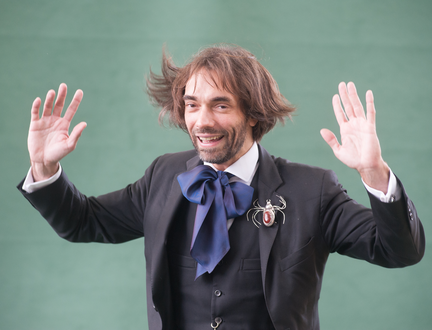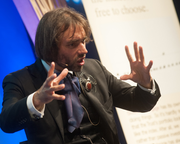More articles Saturday 15 August 2015 7:43pm
Young people won’t struggle to succeed says Cédric Villani at the Book Festival

The future of mathematics is being damaged by a lack of willingness among young people to struggle to succeed, one of the world’s greatest living mathematicians has said. Speaking at the Book Festival in an event supported by the Scottish Mortgage Investment Trust, the French ‘rock-star mathematician’ Cédric Villani said that a developing general culture of permissiveness meant children were not being challenged to push themselves.
“Like in any learning process there has to be some element of ‘pain’ [in learning maths],” he said. “It’s normal: you’ll never become a professional soccer player unless you suffer like crazy; you don’t become a professional writer unless you write and write and read; you won’t become good at maths if you are just having some fun or whatever. But you need motivation if you’re going to accept the suffering to help you progress. So how to motivate the kids is a big issue.
“Also culture is evolving, and time is against us because the more societies develop and life becomes easier, less and less constraints are accepted and everybody wants freedom. The problem all societies encounter at some point is where their kids believe it’s an attack on their freedom to impose studying on them if they don’t like it.”
Cédric said that this was at odds with previous decades when children undertook studying without questioning their teachers. Illustrating the impact motivation has on scientific discovery, he highlighted the fact that some of the greatest leaps were made in Soviet Russia during the 20th century because the scientists were hugely motivated to succeed because the success represented one of the few ways to leave the country.
Addressing a packed audience on the creative life of a mathematician, the author of Birth of a Theorem, which has sold more than 100,000 copies, also explained why he believed that the human brain was unsuited to maths “I believe strongly that the human brain, and the mathematician’s brain also, is first based on emotions,” he said. “Happiness, anger, fear, love are the basic driving emotions of the human beings, and have been governing humanity for hundreds of thousands of years, much longer than logical, rational thinking. Rational thinking came much more recently, and that’s normal because in the nature there is no advantage in rational thinking. Even in the human world, if you’re engaged in a war, it’s much more efficient to be irrational and be ready to die than try to explain, discuss and find rationality.
“But when you have time and you can build things and develop society, rational thinking can help make technology so efficient and so powerful. But it was something we had to acquire and it took time and it was difficult. Even now mathematics, even for mathematicians, is difficult activity. Thinking rationally is difficult, correcting mistakes is difficult.”
Cédric has won numerous awards for his work, including the Fields medal, the maths’ world equivalent of the Nobel Prize, and the prestigious Legion of Honour from his own country. Birth of a Theorem, he said, was an attempt to describe the creative process that he as a mathematician goes through in discovering a new theory, and how breakthroughs often came from out of the blue.
He said: “What is the life of a mathematician? A lot of mistakes then repairing the mistakes, a lot of nights spent working like crazy, then a sudden illumination - sometimes I’d wake up or caring for my kid, when suddenly something will come to me, maybe while shaving or meeting somebody. There is the popular image of Newton seeing the apple fall down and he thinks of gravity. It’s not like this that things happen, Researchers will tell that when the flash arrives and they get a good idea, it comes with something that has nothing to do with what they are doing - it can be in the bath, out for a walk or crossing the road. Sometimes illumination comes when you least expect it.”
Likening the process to that of an episode of the US crime detective Columbo, he said that the process of discovery was key. “It’s the journey that matters,” he explained. “When you watch an episode of Columbo, it’s not to know the identity of the guilty guy that matters, it’s how you discover it, and in science it’s a big part of it, not to understand the result, it’s how you reach it that’s so interesting.”
Look, Listen & Read
- 2025 Festival:
- 9-24 August
Latest News
 Communities Programme participants celebrate success of 2024
Communities Programme participants celebrate success of 2024




